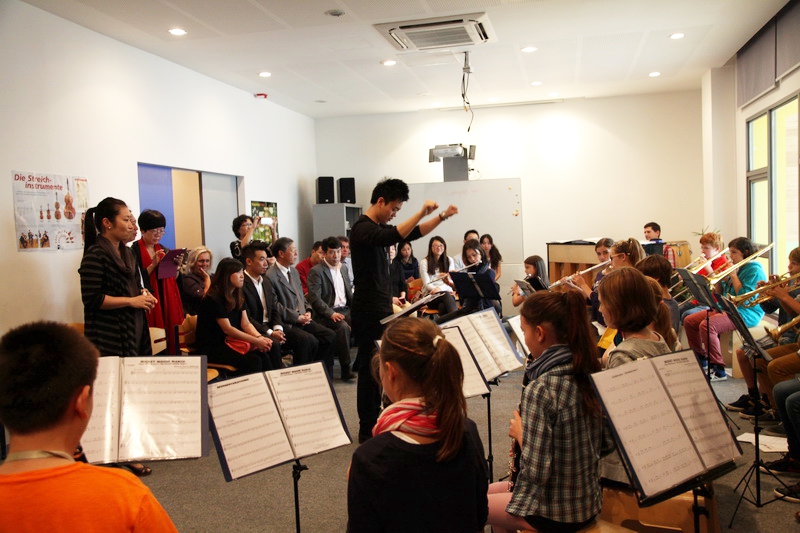CMIA and CAFIM address musical education issues
China Association of Musical Instruments (CMIA) und Confederation of European Music Industries (CAFIM) assemble for lesson-attendance session at German School in Shanghai/Pudong applying “Music-in-the-Classroom” methods using musical instruments
With musical education coming to assume an important issue of talks conducted in regular intervals by European and Chinese musical instrument manufacturers associations, time had come round for general-information sharing on this subject to be followed by a practical approach.
 Legend: Visit at the German School in Pudong “Music in the classroom”; Delegation of CMIA and CAFIM in the background Legend: Visit at the German School in Pudong “Music in the classroom”; Delegation of CMIA and CAFIM in the background |
For some years now, the German School located in the Pudong district of Shanghai, not far from the trade-fair grounds where the annual “Music China” expo takes place, has been successfully applying the “Music-in-the-Classroom” concept evolved by the Music Education Academy in Wiesbaden (Germany) and supported by the National Association of German Musical Instruments Manufacturers (BDMH). Developed by music educators for music educators, this method is used for collective instrumental musical instruction at normal state-run schools providing general education and is employed for teaching wind, bowed and percussion instruments. In Pudong, wind-instrument tuition is provided group-wise. Accordingly, it made sense for both organizations that traditionally meet for talks within the scope of the Music China event, to assemble there for a lesson-attendance session. This also afforded a good opportunity for colleagues from CAFIM member countries to acquaint themselves with musical education presented in this format. In Germany, where the “Music-in-the-Classroom” concept was introduced in 1987, this form of teaching has had a tremendous impact on boosting instrument sales. Many youngsters taught to play an instrument in this way have at least continued to pursue music as a pastime if not professionally, thus permanently enhancing business in the music branch, true to the popular slogan: “Make more music makers“!
All participating in the lesson attendance went away highly impressed by the tuition method as well as by the congenial atmosphere and enthusiasm radiating from pupils and teachers alike. Tuition is provided by a music teacher from Germany, previously trained at the Music Education Academy, in conjunction with two Chinese colleagues, one of whom studied in Germany. Collective instruction is given to the children on at least three school days a week, complemented by tuition on a one-to-one basis. Accordingly, significant learning progress becomes palpable within a short space of time.
Obviously stimulated by the impressive lesson-attendance session, the CMIA has now put forth a proposal aimed at arranging further guest visits for delegates responsible for musical education in China at normal day schools providing a general curriculum and displaying an interest in the concept.
In 2014, it is planned to hold a seminar on music tuition combined with teacher in-service training geared to the “Music-in-the-Classroom” method centrally within the ‘Music China’ fair complex with the objective of presenting what has been so successfully implemented in Germany to other interested users on a broader scale. This would definitely endorse the aims pursued by the organizers of the Frankfurt Music Fair, who have continued to provide financial assistance and sponsorship to the Academy in support of the “Music-in-the-Classroom” concept for so many years.
As a school subject, music has come to qualify for increasing significance, not least on account of growing public awareness of the need through “Music-in-the-Classroom” teaching ideas. This method generates additional incentive for shared musical activity beyond normal class tuition. Schools not only make their premises and tutors available, they also propagate the initiative of making music together, thus contributing to upholding instrumental tuition, an aspect of vital importance not to be underestimated! The wealth of given opportunity to perform to audiences, enhanced by involvement in joint activity, all inspired by the “Music-in-the-Classroom” impetus, serves to promote individuality while strengthening cooperation within the group. It is always gratifying to observe increasing numbers of pupils taught applying the “Music-in-the-Classroom” concept developing amazing skills in other subjects beyond the realms of music.
